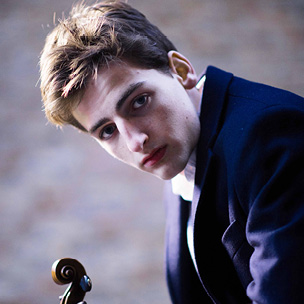Picking out fine points of the IVCI semifinals, looking forward to finals
With the finalists announced below, as the International Violin Competition of Indianapolis pauses to allow for the initiation of four nights of concerto performances that constitute the final stage, I pause to take stock of what I heard in the semi-final round (September 16-19), where my attendance (via live stream) was more sporadic than I wished.
Let's concentrate on the best performances I heard of John Harbison's "Incontro," the commissioned work for the current competition. Performances that were sensitive to the true duo nature of the work impressed me; a few I heard (not by finalists) seemed to assume the music was all about the violin.
 |
| Joshua Brown had strong statements to make throughout both phases thus far. |
After the piano's separately designed solo arpeggios (pedaled so as to suggest mystery, as they were here), Joshua Brown projected the lyrical violin line with long, well-supported phrases. The middle section sounded deliberately tentative, thus matching the piano's brief "hiccuping" figures. The vigor both parts gain toward the climax was well-matched, and the coda (indicated "non vibrato," presumably, since every violinist played it that way) had the kind of emotional neutrality that calmed the outburst of moments before.
The Italian title expresses the pitched opposition of teams in contention. But the music makes the most of the common goal of triumph and how that ends up mastering the encounter. Finalist-to-be Sirena Huang, who offered the last semifinal recital on Monday night, showed her keen sense of the whole piece by imparting a sighing quality to some of her first phrases, and she made the most of the violin's way of answering those piano "hiccups" before fashioning another apt "non vibrato" coda.
 |
| Sirena Huang's competition experience has been evident here. |
"Incontro" struck me as one of those commissioned IVCI pieces that deserve to live, like George Rochberg's "Rhapsody and Prayer" (1990). Compositions that provide a knotty test for the performer may have advocates for the competition setting, like the one Leon Kirchner wrote for the 1986 IVCI.
But giving the contestant a problem to solve tends not to put the performer across on the level of the conventional repertoire. Witold Lutoslawski's "Subito" (1994) falls somewhere in between; that year's gold medalist, Juliette Kang, made quite a good case for it, including on the recording that was part of her prize.
After opening with Harbison's piece (a further indication of how well it communicates when it's understood well), now-finalist Minami Yoshida went on to lend her strong sense of style and robust tone to a couple of undoubted masterpieces, Beethoven's "Kreutzer" Sonata and Cesar Franck's Sonata in A. Her dynamic variety, nothing abrupt but always well-linked from phrase to phrase, was exceptional in the latter work. Her encore selection, Wieniawski's Polonaise in D major, was among the most brilliantly performed. And always, that rich tone never faltered.
Here's the statement the IVCI put out Monday night after the jury's assessment of the semifinals has been tabulated:After eight days of competition, including the Preliminaries (September 11-
14), and Semi-Finals (September 16-19), the 2022 Jury has selected the following individuals to advance to the AMPG Finals:
Joshua Brown (United States)
Julian Rhee (United States)
Minami Yoshida (Japan)
Claire Wells (United States)
SooBeen Lee (South Korea)
Sirena Huang (United States)



Comments
Post a Comment